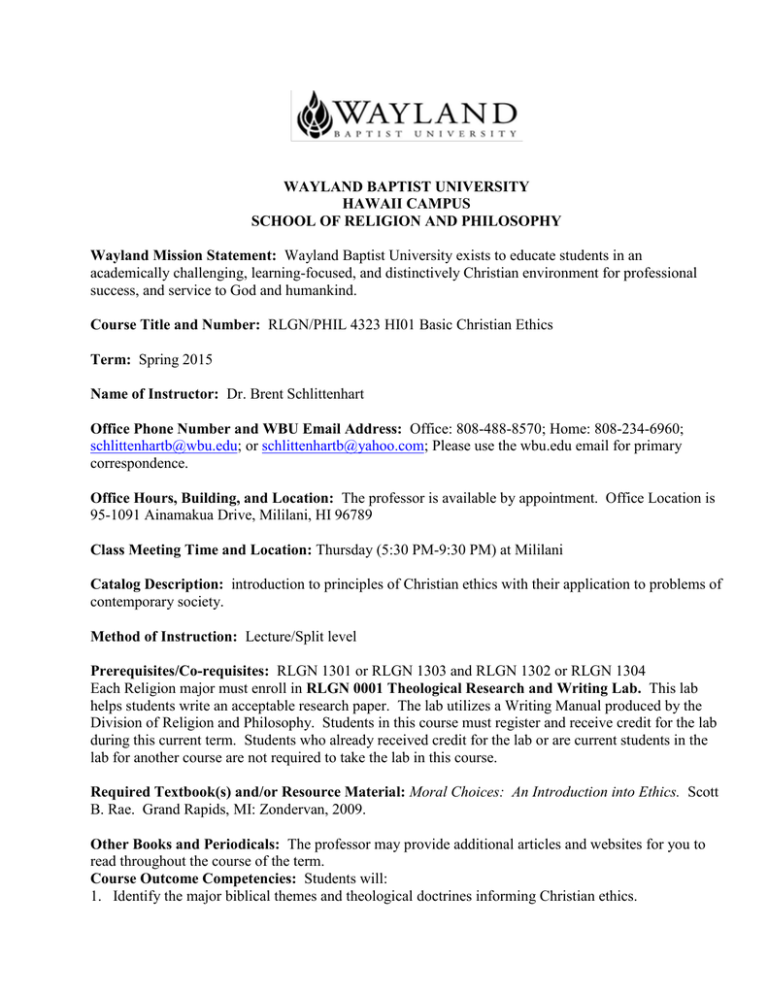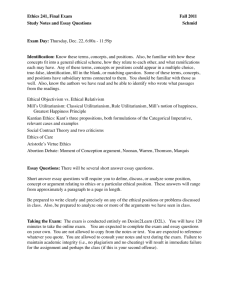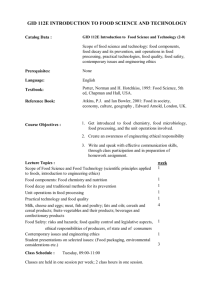academically challenging, learning-focused, and distinctively Christian environment for professional
advertisement

WAYLAND BAPTIST UNIVERSITY HAWAII CAMPUS SCHOOL OF RELIGION AND PHILOSOPHY Wayland Mission Statement: Wayland Baptist University exists to educate students in an academically challenging, learning-focused, and distinctively Christian environment for professional success, and service to God and humankind. Course Title and Number: RLGN/PHIL 4323 HI01 Basic Christian Ethics Term: Spring 2015 Name of Instructor: Dr. Brent Schlittenhart Office Phone Number and WBU Email Address: Office: 808-488-8570; Home: 808-234-6960; schlittenhartb@wbu.edu; or schlittenhartb@yahoo.com; Please use the wbu.edu email for primary correspondence. Office Hours, Building, and Location: The professor is available by appointment. Office Location is 95-1091 Ainamakua Drive, Mililani, HI 96789 Class Meeting Time and Location: Thursday (5:30 PM-9:30 PM) at Mililani Catalog Description: introduction to principles of Christian ethics with their application to problems of contemporary society. Method of Instruction: Lecture/Split level Prerequisites/Co-requisites: RLGN 1301 or RLGN 1303 and RLGN 1302 or RLGN 1304 Each Religion major must enroll in RLGN 0001 Theological Research and Writing Lab. This lab helps students write an acceptable research paper. The lab utilizes a Writing Manual produced by the Division of Religion and Philosophy. Students in this course must register and receive credit for the lab during this current term. Students who already received credit for the lab or are current students in the lab for another course are not required to take the lab in this course. Required Textbook(s) and/or Resource Material: Moral Choices: An Introduction into Ethics. Scott B. Rae. Grand Rapids, MI: Zondervan, 2009. Other Books and Periodicals: The professor may provide additional articles and websites for you to read throughout the course of the term. Course Outcome Competencies: Students will: 1. Identify the major biblical themes and theological doctrines informing Christian ethics. 2. Identify the major philosophical ethical theories informing Christian ethics 3. Apply the major theological doctrines and major philosophical theories to contemporary ethical issues to frame distinctively Christian ethical responses. Attendance Requirements—External Campuses Students enrolled at one of the university’s external campuses should make every effort to attend all class meetings. All absences must be explained to the instructor, who will then determine whether the omitted work may be made up. When a student reaches that number of absences considered by the instructor to be excessive, the instructor will so advise the student and file an unsatisfactory progress report with the external campus executive director/dean. Any student who misses 25 percent or more of the regularly scheduled class meetings may receive a grade of F in the course. Additional attendance policies for each course, as defined by the instructor in the course syllabus, are considered a part of the university’s attendance policy. A student may petition the Academic Council for exceptions to the above stated policies by filing a written request for an appeal to the executive vice president/provost. The student is responsible for turning in all required assignments. If a student misses a class when an exam is given, arrangements must be made by the student with the professor to take the exam. Tardies and/or early departures will also count towards an individual’s attendance record. Disability Statement: In compliance with the Americans with Disabilities Act of 1990 (ADA), it is the policy of Wayland Baptist University that no otherwise qualified person with a disability be excluded from participation in, be denied the benefits of, or be subject to discrimination under any educational program or activity in the university. The Coordinator of Counseling Services serves as the coordinator of students with a disability and should be contacted concerning accommodation requests at (806) 291- 3765. Documentation of a disability must accompany any request for accommodations.” Course Requirements and Grading Criteria: 1. Each student will read the assigned readings and participate in the classroom experience. 2. Each student will take a midterm and a final exam. Material will come from the assigned readings and class notes. 3. Each student will write a research paper on an ethical topic. The paper needs to follow the Turabian format by using the WBU Religion Writing Lab Style Guide in form and documentation and use footnotes in the paper. The paper needs to include a title page, table of contents, and a bibliography in addition to the 6-10 pages of text and requires a minimum of ten sources. Margins for the paper need to conform to the writing lab style guide, which states that you use 1.5 inch left margin and 1 inch margins elsewhere for the papers, 10 or 12 New Times Roman font, and double space the body of the paper. 4. Each student will write essays on assigned weeks. The essay needs to be a one page typed response to the question and may be used in connection with the class dialogue. The response should stimulate and demonstrate reflective thinking on the part of the student and is not a research topic. Resources: The student should request many resources through the WBU main campus library and have them mailed directly to his/her home. The Bible does not count as one of your minimum resources but follow the style guide for footnoting a reference, when referencing a study note from the NIV Study Bible use the form for one general editor. START YOUR RESEARCH EARLY! Course Evaluation: University Grading System A 90-100 B 80-89 C 70-79 D 60-69 F BELOW 60 I INCOMPLETE** Cr FOR CREDIT NCr NO CREDIT WP WITHDRAWAL PASSING WF WITHDRAWAL FAILING W WITHDRAWAL ** A grade of incomplete is changed if the work required is completed prior to the last day of the next long (10-15 weeks) term, unless the instructor designates an earlier date for completion. If the work is not completed by the appropriate date, the I is converted to a grade of F. An incomplete notation cannot remain on the student’s permanent record and must be replaced by the qualitative grade (A-F) by the date specified in the official University calendar of the next regular term. An incomplete turned to a qualitative grade will be indicated by the notation I/grade on the student transcript. Procedure for computations of final grade 1. Midterm exam: 2. Final exam: 3. Research Paper: 4. Essay Average 25% 25% 25% 25% Late assignments will not receive full credit and will usually receive a five point minimum reduction. Students shall have protection through orderly procedures against prejudices or capricious academic evaluation. A student who believes that he or she has not been held to realistic academic standards, just evaluation procedures, or appropriate grading, may appeal the final grade given in the course by using the student grade appeal process described in the Academic Catalog. Appeals may not be made for advanced placement examinations or course bypass examinations. Appeals are limited to the final course grade, which may be upheld, raised, or lowered at any stage of the appeal process. Any recommendation to lower a course grade must be submitted through the Executive Vice President/Provost to the Faculty Assembly Grade Appeals Committee for review and approval. The Faculty Assembly Grade Appeals Committee may instruct that the course grade be upheld, raised, or lowered to a more proper evaluation. Tentative Schedule: Course Outline and Calendar Week 1 02/26/2015 Introduction, Definition and Foundation of Christian Ethics Week 2 03/05/2015 The Ethical Task Reading: Rae chapter 1 Essay 1: After reading chapter one in the text, what do you see as the most beneficial concept in the chapter and what do you see as the most challenging concept in the chapter? Week 3 03/12/2015 Reading: Rae chapter 2 Ethics in the Bible Essay 2: What are some of the important things Christians can learn and apply from the ethics of the Old and New Testaments? 03/19/2015 Spring Break No Classes Week 4 03/26/2015 Ethical Systems and Moral Reasoning Reading: Rae chapter 3 Essay 3: Which of the moral theories discussed in this chapter seem to present the biggest challenges that Christians encounter in the world? Week 5 04/02/2015 Model Christian Proposals and Ethical Decision Making Reading: Rae chapter 4 Essay 4: What is your opinion on the author’s model for making moral decisions and why? In the case study with patents, what decision would you make and why? Midterm Exam Take Home Week 6 04/09/2015 Reading: Rae chapter 5 Midterm Exam Due Contemporary Issues and Christian Ethics Week 7 04/16/2015 Reading: Rae chapters 6 and 7 Contemporary Issues and Christian Ethics Week 8 04/23/2015 Reading: Rae chapters 8 and 9 Contemporary Issues and Christian Ethics Week 9 04/30/2015 Reading: Rae chapter 10 Contemporary Issues and Christian Ethics Week 10 05/07/2015 Reading: Rae chapters 11 and 12 Research Paper Due Contemporary Issues and Christian Ethics Week 11 05/14/2015 Final Exam and Teaching Presentations Sample format for essay questions, at the top of the page include the following information. Your Name Basic Christian Ethics RLGN-PHIL 4323HI31 Spring 2015 Instructor: Dr. Brent Schlittenhart Essay Number and Question Additional Information: Academic Honesty (Plagiarism): University students are expected to conduct themselves according to the highest standards of academic honesty. Academic misconduct for which a student is subject to penalty includes all forms of cheating, such as illicit possession of examinations or examination materials, forgery, or plagiarism. (Plagiarism is the presentation of the work of another as one’s own work.) It is the student’s responsibility to be familiar with penalties associated with plagiarism stated in the catalog. Classroom Disruption Students who disrupt a class will be directed to leave immediately and report to the external campus executive director/dean or dean of students, who will discuss with the student the cause of the disruption. The student will return to the class only with permission of the executive director/campus dean or dean of students and faculty member involved.







